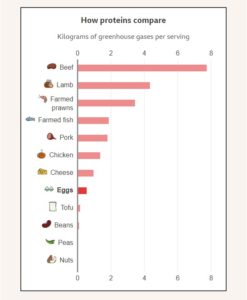Most of us are thinking about getting healthy and losing weight at this time of year and may also be keen to do our bit for the planet. Good news! Most key dietary recommendations for healthy eating are sustainable for the planet and for our long term health. Focusing on a couple of small changes and sticking with them will make a bigger difference than more radical, but short-lived changes.
Diets don’t work!
While many of us may have got off to a great start on the healthy eating front, these healthy resolutions usually fall by the wayside before the end of January. Research clearly shows that diets don’t work. Most of us try to make too many changes at once that we can’t sustain and end up reverting to our old habits. Focusing on a small number of changes that we can sustain for good is going to have a much bigger impact on our long-term health and waistline.
Sustainable eating
And of course, when we are talking about sustainable eating habits, we should also be thinking about the environmental impact of our food. Food production is responsible for ¼ of global greenhouse gas emissions. Just like the impact on our health, we can all make small, long term changes that have a bigger effect on the planet than more drastic changes that we can’t keep up.
So what is a sustainable diet?
It’s hard to have consensus on what a sustainable diet actually is and it is going to be different in different parts of the world For example in Ireland, our dairy products are farmed in a lower impact way than they are in other parts of the world. The EAT planetary health guidelines published in the Lancet journal have a great deal of scientific and medical consensus behind them and good ones to follow. These dietary recommendations are also much better for our health. If we all adopted the planetary health diet, it would prevent 11m premature deaths per annum.
4 things to focus on
-
Reduce meat consumption
Beef and lamb are right at the top of the list of foods that are responsible for greenhouse gas emissions. It’s true that Irish meat is produced more sustainably than in other parts of the world and healthier too as many animals are eating a largely grass-based diet, but research is still showing that we are eating too much. WHO recommendations are to limit red meat to no more than 3 times per week and to avoid processed meat like sausages and cured meats. We don’t all need to become vegans, but I recommend having at least 2 meat-free dinners per week. The Happy Pear cookbooks and website are a great place to start for some easy recipes.
Source: BBC climate change food calculator https://www.bbc.com/news/science-environment-46459714
-
Eat more plant-based proteins
It’s all very well suggesting that we eat less meat, but if we replace it with refined carbohydrates or processed food, that is not doing the planet or our health any good. We do need protein to keep us fuller for longer, keep us healthy and to support healthy weight loss. Healthier choices to choose instead of meat include
- Nuts and seeds – considered the lowest impact form of protein. A palmful is a portion. They also contain fibre, vitamins, minerals and healthy fats and have been shown to help support heart health. Add to your breakfast, have as a snack or sprinkle on a salad or soup
- Pulses (chickpeas, lentils, beans, peas, hummus) – also low in calories and a great source of fibre to support our gut bacteria and very cheap too. Lentils cook in less than 30 minutes and are great to add to soups and Bolognese. Tinned beans and chickpeas can be added to salads, casseroles, stews. Even if you still include meat, you are bulking the meal out with healthier and more sustainable ingredients
- Other non-meat proteins that can help the planet and our waistline include tofu and other soya products. We can also eat eggs and chicken (should be free range at least), fish and dairy products like full fat natural yoghurt and cheese. But these should be in smaller quantities than we may have been eating them previously
-
Eat more veg
This is the recommendation I find makes the most impact in terms of weight and health. We should be aiming to eat at least 5 (ideally more) portions of vegetables daily, ½ plate at lunch and dinner. These are filling and great sources of vitamins, minerals, fibre, water. They are also usually cheap. For planetary health, we should be aiming to buy in season where we can and avoid foods that are flown in like strawberries at this time of year. Find out more about what’s in season on the stopfoodwaste website
Frozen veg and fruit can be a cheaper choice and helps to reduce the preparation time that puts some people off eating more veg. Filling half of your plate with veg also helps to ensure you are eating the correct proportions of protein (1/4 plate) and complex carbs (1/2 plate) and this balance is key to both sustained weight loss and to planetary health
-
Watch portion size
Research shows that most of us don’t know what a correct portion size is and this, together with the fact that our plates and serving sizes have dramatically increased in the last 30 years, means that most of us eat too much. This does not matter if it only happens from time to time, but this is what causes the slow creep of weight gain. We don’t notice a couple of pounds a year, but that adds up to a stone every decade. From a planetary health perspective, we are using more resources than we need to and wasting more food too. Life is too short to start weighing and measuring all our food but if you feel that portion size is an issue for you, then try
- Measuring out a correct portion of a few of the foods you eat all the time – cereal, pasta, rice, potatoes…..
- Swapping to a smaller plate, especially for your dinner
Related to this is to aim to fast for 12 hours overnight (intermittent fasting), which has been shown to support sustained weight loss and has lots of other health benefits too
Easy green swaps
| Swap from this | To this |
| Chilli con carne | Vegetable and bean chilli |
| Spaghetti Bolognese | Wholemeal spaghetti with lentil and veg bolognese |
| Beef curry | Chickpea and butternut squash curry |
| Breakfast roll / fry | Scrambled eggs, spinach and mushrooms with slice wholegrain bread |
| Ham and cheese sandwich | Wholegrain wrap with hummus and salad |
Green menu
| Breakfast | Porridge with stewed apple and ground linseeds |
| Lunch | Carrot and lentil soup with slice wholegrain bread |
| Dinner | Butternut squash and chickpea curry |
| snack | Oatcakes with hummus / satsuma and palmful nuts |
Glenville Nutrition, Nutritional Therapist with Glenville Nutrition Ireland



